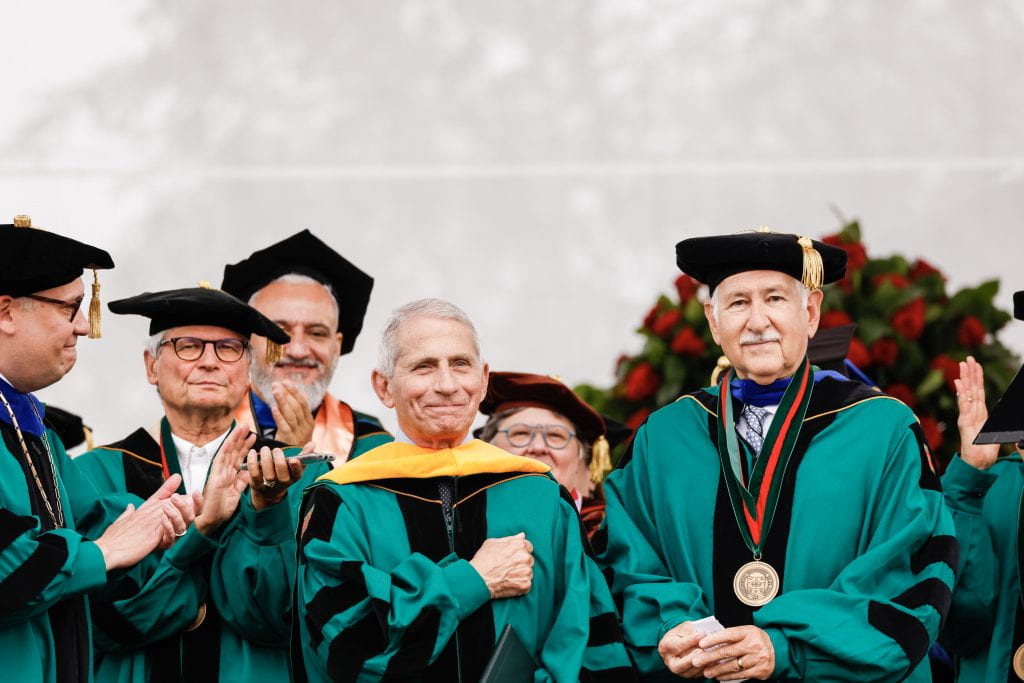Anthony S. Fauci, MD, the recently retired director of the National Institute of Allergy and Infectious Diseases (NIAID) of the National Institutes of Health (NIH), has made seminal contributions in infectious disease and immunology research and to public health, most recently through his work to inform the public about COVID-19.

Medical adviser to seven U.S. presidents, Dr. Fauci served as NIAID director from 1984 through this past December and oversaw an extensive research portfolio on domestic and global health issues. The COVID-19 pandemic, however, presented him with likely the most formidable challenge of his career. He became the widely recognized face of public health as he worked to stem the spread of the virus and accelerate development of lifesaving vaccines.
At NIAID, Dr. Fauci oversaw the institute’s basic and applied research to prevent, diagnose and treat diseases such as HIV/AIDS, respiratory infections, diarrheal disease, tuberculosis and malaria, as well as emerging diseases such as Ebola, Zika and COVID-19. He also led the NIAID research effort on transplantation and immune-related illnesses, including autoimmune disorders, asthma and allergies.
Dr. Fauci was a leading adviser on global HIV/AIDS issues, working as a key member of the scientific effort after AIDS first was recognized in 1981 and then conducting pivotal work that underpins the understanding of the disease. His laboratory made seminal contributions to research into how HIV destroys the body’s defenses and leads to susceptibility to deadly infections. Further, he was instrumental in developing treatments that enable people with HIV to live long and active lives.
While advising President George W. Bush, Dr. Fauci was a principal architect of the President’s Emergency Plan for AIDS Relief (PEPFAR), a program that has saved more than 25 million lives throughout the developing world. In 2008, President Bush awarded Dr. Fauci the Presidential Medal of Freedom, the country’s highest civilian award, for his work in HIV/AIDS.
During Dr. Fauci’s tenure at NIAID, he also led initiatives to bolster medical and public health preparedness against emerging infectious disease threats such as pandemic influenza and COVID-19. As longtime chief of the Laboratory of Immunoregulation, Dr. Fauci made many contributions to basic and clinical research into the pathogenesis and treatment of immune-mediated and infectious diseases.
Dr. Fauci’s laboratory also helped pioneer the field of human immunoregulation. He is widely recognized for identifying and explaining the precise ways that immunosuppressive agents modulate the human immune response.
Born in Brooklyn, New York, Dr. Fauci attended Regis High School in Manhattan, where he captained the school’s basketball team despite being only 5 feet 7 inches tall. He earned a bachelor’s degree from the College of the Holy Cross in Worcester, Massachusetts, before earning his medical degree from Cornell University’s Medical College (now Weill Cornell Medicine) in New York City, ranking first in his graduating class.
Dr. Fauci has delivered major lectures all over the world and is the recipient of numerous awards, including the National Medal of Science, the George M. Kober Medal of the Association of American Physicians and the Mary Woodard Lasker Award for Public Service. He has received 58 honorary doctoral degrees from universities in the United States and abroad.
Dr. Fauci is a member of the National Academy of Sciences, the National Academy of Medicine, the American Academy of Arts and Sciences and the American Philosophical Society, as well as other professional societies including the American College of Physicians, the American Society for Clinical Investigation, the Infectious Diseases Society of America and the American Association of Immunologists. He serves on the editorial boards of many scientific journals and is an author, coauthor or editor of more than 1,400 scientific publications and several textbooks.
In addition to receiving an honorary degree at 2023 Commencement, Dr. Fauci served as speaker at the School of Medicine’s graduation ceremony for MD and MD/PhD students. In January 2021, he spoke about the COVID-19 pandemic as part of the Washington University Department of Medicine’s weekly Grand Rounds. Several thousand people from the university and the general public watched his live, online talk, in which he highlighted the considerable challenges of the pandemic but also emphasized the hope spurred by the distribution of effective vaccines.